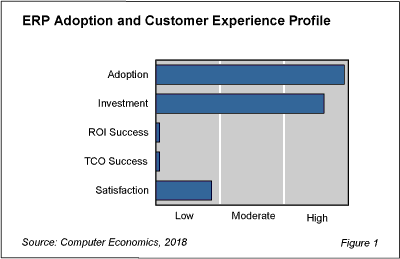It is rare that a mature technology such as enterprise resource planning (ERP) systems see such a high rate of investment. Almost three-quarters of all organizations have ERP systems, according to our annual Technology Trends study. ERP is the transactional backbone for many organizations’ systems of record and has been for some time. As such, many organizations have been nursing legacy ERP systems for years, in some cases even decades. With the strong economy and the success of early cloud investments, it appears many organizations believe this is the perfect time to upgrade those legacy ERP systems.
Figure 1 from our full report, ERP Adoption Trends and Customer Experience, shows that ERP adoption is high. In fact, the adoption rate is the highest of any technology in the survey. The investment rate is also high, up from only modest investment in the previous year. ERP vendors continue to expand their offerings, and cloud solutions are making ERP easier to implement and maintain than it has been in the past.
However, it must be noted that ERP deployments are still very complicated and often require the reassessment and sometimes redesign of a lot of business processes. Because of this, return on investment, total cost of ownership, and satisfaction ratings are all low. Companies seem to be willing to put up with some disappointments in search of new capabilities and the reduction of infrastructure burden that comes with transitioning away from legacy ERP systems.

The ERP profile ratings are based on comparisons with 11 other technologies in our Technology Trends 2018 study. The comparisons are on a relative scale, and each technology is categorized as having low, moderate, or high rates relative to other technologies in the study.
“Out data is showing that companies are trying to reduce infrastructure and support burdens across the IT organization,” said David Wagner, vice president for research at Irvine, Calif.-based Computer Economics. “Cloud offerings in the ERP space are a perfect choice for reducing data center footprint and complexity. However, this should not be taken lightly. It is imperative that the entire business is closely involved from the beginning as the new system must be closely tied to business processes or it will be a certain failure.”
The variety of ERP offerings and how they are deployed is obviously one reason for the increased investment. Another is that newer ERP systems are expanding to offer capabilities previously only available in other specialty business systems such as customer relationship management, supply chain management, and business intelligence and data analytics. ERP vendors are even beginning to package machine learning and artificial intelligence (AI) capabilities directly into their systems. Providers also are incorporating newer technologies into this mature category of business systems. For example, big data technologies are allowing ERP systems to handle much larger data sets full of unstructured data that previously were difficult to manage. AI is now being used to anticipate supply chain disruptions and even execute orders to mitigate any negative effects before a human could even detect the problem. These new capabilities combined with cloud and SaaS options are making ERP more effective, easier to manage, and more affordable, especially for small companies.
The full report helps IT executives understand how aggressively their peers are investing in ERP and the risks and rewards presented by those investments. We report worldwide adoption and investment rates by sector, organization size, and geography. We also measure customer experience in terms of the success rates for return on investment (ROI) and total cost of ownership (TCO). Finally, we assess what functions organizations are using ERP systems for today. We wrap up with our recommendations for improving the ROI of ERP.
This Research Byte is a brief overview of our management advisory on this subject, ERP Adoption Trends and Customer Experience. The full report is available at no charge for Computer Economics clients, or it may be purchased by non-clients directly from our website (click for pricing).

